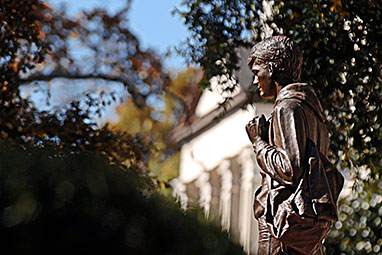SPARTANBURG, S.C. – Wofford College and Converse College are poised to collaborate in a critical academic area that impacts all disciplines and students – the library. The colleges jointly have received a $75,000 grant from the Andrew W. Mellon Foundation to improve the effectiveness and efficiency of their library services in the digital information age.
The 18-month study of the libraries grew out of a collaborative process between the two colleges to address higher education issues.
“We are delighted to have the opportunity through the Mellon Foundation’s generous support to collaborate with Converse College in planning for improvements to our respective libraries and in planning for how we might cooperate ever more effectively for the benefit of students at both institutions,” says Dr. David S. Wood, provost at Wofford. “The project will allow us to conduct an 18-month comprehensive analysis of our libraries to include resources, facilities, staffing, acquisition practices, policies, services, and technological infrastructures with an eye toward collaboration that will enhance learning opportunities for those we serve.
“The initiative will afford us the opportunity to examine recent developments in libraries on the national level, future trends in resource acquisition, and emerging technologies in the rapidly changing arena of analyzing resources and databases,” Wood continues.
The study will explore the possibility of an integrated library management system, including sharing library personnel; integrating technology, including the possibility of a shared research portal for students and faculty; reviewing the strengths and weaknesses of the collections in each library; conducting a usage analysis of each collection; and exploring the possibility of sharing library personnel beyond an integrated management structure.
“Our libraries of the future will reach out to students, faculty and broader community members in ways that take full advantage of dramatic technological change, serve our distinctive missions, and play a vital role in our communities,” says Dr. Jeffrey H. Barker, vice president for academic affairs at Converse. “We look forward to enhancing our programs and maximizing our intellectual resources through the support of the Mellon Foundation.”
Wofford President Nayef H. Samhat points out that Wofford and Converse share a long history of collaboration, including a course exchange agreement and a mutually supportive relationship. “We believe our colleges can develop a plan, using this generous Mellon Foundation grant, to leverage our current information resource assets that will allow our students and faculty to reap the benefits of the rapidly expanding technological advancements on our campuses,” Samhat says. “Such collaboration will enhance the student experience on both campuses, and will serve to continue the collaborative spirit of our two institutions.”
“It is an honor to receive this collaborative grant from one of the most prominent and longstanding national leaders supporting the advancement of academic scholarship and the liberal arts,” Converse President Betsy Fleming says. “This award certainly reinforces the positive power of effective partnership and highlights the exponential benefits of such collective strategic initiatives for the students, faculty and staff at both Wofford and Converse.”
In applying for the grant, the colleges pointed out that technological advances on both campuses demonstrate that the colleges are poised to be successful in the endeavor.
For example, Wofford recently became one of only three institutions in the Carolinas to move its library, the Sandor Teszler Library, to the new and innovative SUMMON platform, known at Wofford as “Wofford OneSearch.” As a result, the college provides students and faculty with access to more than 200 million electronic books, journals and other documents in a Google-like search format.
Converse has upgraded its MILLENIUM system, is considering further upgrades, and has increased electronic holdings and online resources, while also reducing traditional print resources. Student and faculty access has been increased in dramatic ways, especially as online courses and programs have been developed.
The colleges also noted: “Both institutions possess an entrepreneurial dynamic and are willing to think in new ways regarding the use of technology and its role in the library of the future.”
The combination of these and other factors “provides a backdrop for a planning initiative centered on rethinking how, and by whom, library services are provided in the digital age. This is a topic we are eager to explore.”
